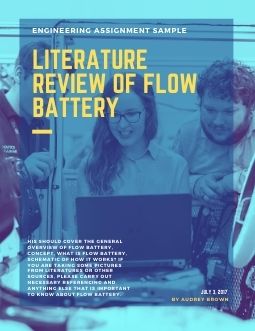
You can download the sample Electronics Engineering case study on Literature review of Flow Battery with the following question for free at the end of this page. For further assistance with Electronics Engineering Assignment help, please check our offerings in Electronics Engineering assignment solutions. Our subject-matter experts provide online assignment help to Electronics Engineering students from across the world and deliver plagiarism free solution with a free Turnitin report with every solution.
(AssignmentEssayHelp does not recommend anyone to use this sample as their own work.)
Electronics Engineering Assignment Questions
Write a literature review of flow battery.
This should cover
- The general overview of flow battery, concept, what is flow battery?
- Schematic of how it works? If you are taking some pictures from literatures or other sources, please carry out necessary referencing.
- Anything else that is important to know about flow battery. Please cover the main important characteristics and properties of flow battery too. Use a creative language in the review is recommended.
Please add some critical thinking/view (or maybe more objective view) in there too, for example, why this type of battery is better than standard or others?, how is different than other types of batteries? or whatever you want to make a point.
Electronics Engineering Assignment Solution on Literature review of Flow Battery
Batteries and the flow batteries differ with each in two major aspects. Firstly, in a standard battery the electro-active materials are usually stored internally and the electrodes are part of the electrochemical reaction. As a battery converts the chemical energy into chemical energy the electrodes are consumed and these chemical changes affect the electrical performance. Secondly, in a conventional battery if more energy is needed, then more batteries with identical components are required and it can only be scaled out.
Description
According to Weber et al. (2011) Flow battery is an electrochemical device that converts the compound energy in the electro-active materials directly to electrical energy, similar to a conventional battery and fuel cells. The electro-active materials in a flow battery, however, are stored mostly remotely in an electrolyte and are presented into the device only during operation. In another study conducted by Nguyen and F. Savinell (2010) it can be founded that flow batteries have electro-active chemical thata is stored externally to the powerful driving systems.
Characteristics
The following characteristics of flow battery are:
1. They are rechargeable fuel cells containing one or more electrolyte material.
2. The Electrolyte is stored externally generally in tanks.
3. They can be recharged rapidly by replacing the electrolyte liquid.
4. Flow batteries have been worked at around 50 mA/cm2, pretty nearly the same as the batteries without convection ones.
Advantages
The flow batteries have the flexible layout, long life cycle and the quick response time as compared to other standard batteries. Other advantages are the no cell to cell equalization requirement, simple state of charge indication and tolerance to overcharge. Skyllas-Kazacos, Chakrabarti, Hajimolana, Mjalli & Saleem (2011) founded that there is safety of storing the active materials from the reactive materials inside the flow batteries making them safe to use.


 WhatsApp Us
WhatsApp Us